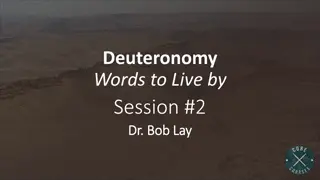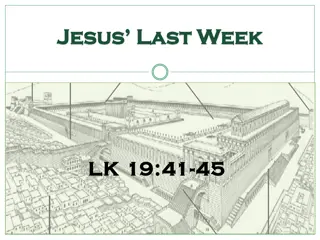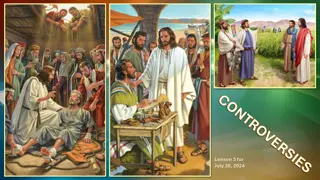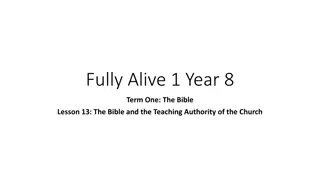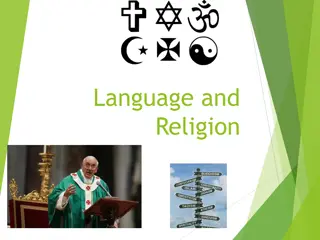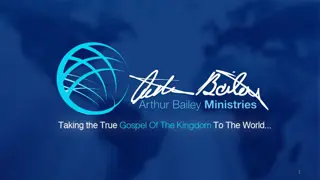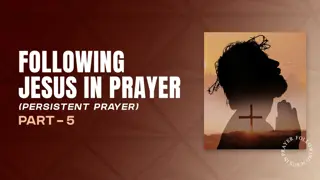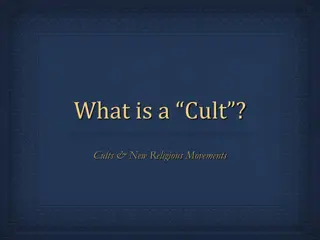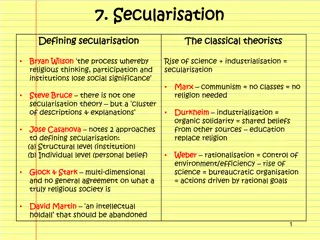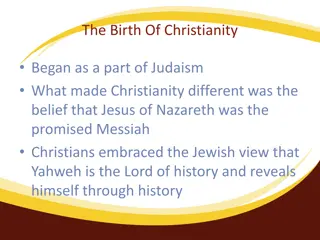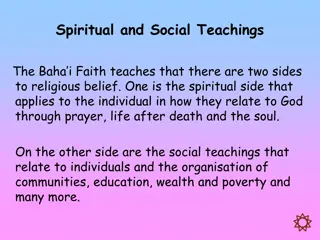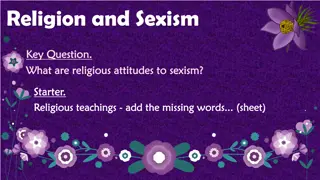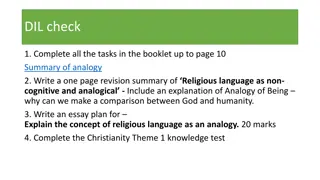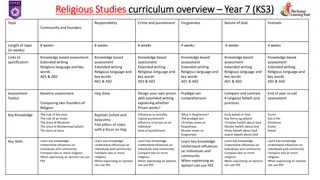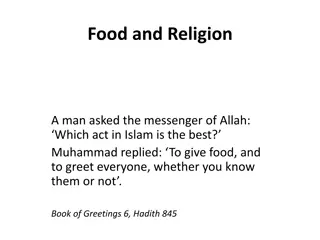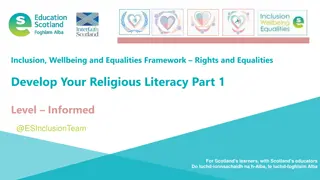Status of Family Laws in India: Hindu vs. Religious Minorities
The family and personal status laws in India vary between Hindu law and those pertaining to religious minorities. While Hindu law has seen extensive reforms, discriminatory provisions still exist. In contrast, laws governing religious minorities have undergone fewer reforms, leading to greater inequ
2 views • 4 slides
Understanding Deuteronomy: Moses' Teachings and Biblical Theology
Delve into the profound teachings of Moses as he imparts the importance of obedience and renewal to Israel in the book of Deuteronomy. Explore how this foundational text contributes to the canon of Scripture and influences later historical, prophetic, and poetic writings, along with the teachings of
2 views • 21 slides
Understanding Religious Conflict: Definition and Types Explored
Religious conflict is a complex and recurring concept throughout history. Scholars have defined it as disagreements between religious groups. This conflict arises from contentious issues touching on ideology, morality, power, and identity, influenced by various socio-political, economic, and cultura
1 views • 13 slides
Overview of Religious Studies Course at Ramsey Grammar School
The Religious Studies course at Ramsey Grammar School for Year 9 students covers topics such as Christianity, Islam, Life and Death, Good and Evil, beliefs, practices, and church diversity. Students will be assessed through a written examination at the end of Year 11, with no coursework requirement.
0 views • 23 slides
Evolution of Akbar's Religious Policy: A Historical Overview
In the 16th century, Akbar the Great implemented a revolutionary religious policy in the Mughal Empire. Initially a devout Sunni Muslim, Akbar evolved his stance to promote harmony and equality among all religions, fostering tolerance and understanding. This shift marked a significant departure from
1 views • 25 slides
Elizabethan Religious Settlement: Unity Amidst Division
Amid religious division in England, Queen Elizabeth I implemented a Religious Settlement in 1559 to unify the country. The settlement, a blend of Protestant and Catholic elements, aimed to maintain peace and prevent rebellions. Elizabeth's strategic compromise pleased most people, though lingering t
0 views • 14 slides
Understanding Secularism: Principles and Advantages
Secularism is the principle of separating government institutions from religious entities to ensure equal rights for believers and non-believers. It safeguards freedom of religious belief and practice, upholds religious freedom, and promotes democracy and fairness. Secularism aims to prevent religio
0 views • 21 slides
Understanding Religious Language: Cognitivism vs. Non-Cognitivism in the University Debate
This discussion explores the debate between cognitivism and non-cognitivism in religious language. Cognitivism asserts that religious claims aim to describe the world and can be true or false, while non-cognitivism argues that such claims express attitudes and cannot be verified. Flew's challenge qu
0 views • 9 slides
Understanding Religious Language: Analogy and Interpretation
Exploring the use of analogy and interpretation in religious language, this content delves into the views of St. Thomas Aquinas and Ian Ramsey regarding the challenges of conveying meaning through analogies. Aquinas rejected univocal and equivocal language for discussing God, emphasizing the limitat
0 views • 18 slides
Guide to Using the BSA Calendar of Religious Observances
The BSA Calendar of Religious Observances is a valuable resource for scheduling scouting events in consideration of various religious holidays and observances. This guide provides an overview of the calendar, highlights important dates, and emphasizes the importance of respecting religious diversity
0 views • 8 slides
Jesus' Teachings in the Last Week: A Heartfelt Rebuke
Jesus' teachings in the temple during his last week on earth were filled with compassion and rebuke. He expressed sorrow over Jerusalem, condemned the corrupt practices of the religious leaders, and foretold the desolation of the temple. Jesus' purpose was to seek and save the lost, emphasizing the
1 views • 11 slides
Controversies and Teachings of Jesus: Lessons in Faith and Forgiveness
Jesus' life was marked by controversy as he clashed with religious authorities over forgiveness, food, Sabbath observance, and even his own sanity. Through his actions, Jesus demonstrated the power of faith, forgiveness, and love, challenging traditional beliefs and societal norms. His encounters wi
0 views • 11 slides
Understanding the Context of Bible Stories and Church Teachings
Explore the importance of context in understanding Bible stories and church teachings, including discussions on Magisterium, Sacred Tradition, and the role of the Church in interpreting scripture. Learn how context enhances our comprehension of religious texts and traditions. Delve into examples hig
0 views • 13 slides
Understanding the Role of Language in Religion
Exploring the significance of language in religious contexts, this content discusses the functions, features, lexicon, grammar, and metaphorical aspects present in religious language. It delves into how religious language upholds spiritual beliefs, persuades believers, and expresses specific attitud
0 views • 8 slides
Understanding the Cultural Dimensions of Food and Religious Influences in Culinary Arts
Explore the impact of religious beliefs on food traditions and dietary restrictions across different cultures in the culinary world. Learn about the influence of major world religions on eating habits, food choices, and culinary practices. Discover how various religious groups, such as Christians, o
0 views • 26 slides
Islamic Teachings and Responsibilities: Insights from Hadith and Quranic Verses
Explore the profound messages found in Islamic teachings through Hadith and Quranic verses. Delve into the importance of being accountable, seeking knowledge, wise spending, and serving others. Reflect on critical questions to deepen your understanding and evaluate success criteria. Engage in group
0 views • 9 slides
Exploring the Teachings of Arthur Bailey Ministries
Discover the insightful teachings of Arthur Bailey Ministries focusing on topics such as today's message from Leviticus, the vision of House of Israel, prayer, and more. Dive into the spiritual journey of understanding teachings, offering donations, receiving prayers, and embracing a community dedic
0 views • 72 slides
The Vital Role of Religious Institutions in Supporting Immigrants
Religions and immigration are interlinked in modern societies, where religions play a significant role in providing services, defending rights, and supporting the social cohesion of immigrants. Mainstream religious institutions serve as key actors in offering assistance, advocating for migrant right
2 views • 14 slides
Understanding Religious Language: Flew, Hare, Mitchell
Exploring the contrasting views of cognitivism and non-cognitivism in the context of religious language through the perspectives of Flew, Hare, and Mitchell. Delve into Flew's challenge on the undetectable gardener, Hare's concept of bliks, and Mitchell's response to the rationality of religious bel
0 views • 7 slides
Teachings on Prayer: Luke 11:1-13 and Luke 18:1-8
Explore the teachings on prayer in Luke 11:1-13 and Luke 18:1-8. The passages highlight the importance of persistence in prayer, trusting in God's provision, and seeking the Holy Spirit's guidance. Through parables and teachings, Jesus encourages believers to pray without losing heart, reminding the
0 views • 19 slides
Understanding Cults and New Religious Movements
Explore the concepts of cults and new religious movements, comparing them to traditional religions. Delve into the defining characteristics of cults, sects, and controversial religious movements. Consider starting your own cult by examining teachings, rituals, authority, and organization. Reflect on
0 views • 23 slides
Religious Accommodation in the Army: Advising Command
The content discusses the role of the Chaplain Corps in advising Soldiers and leaders on religious accommodation in the Army as of February 13, 2019. It covers learning objectives, legal foundations, Army policies, procedures, recent changes, and references related to religious accommodation. The in
0 views • 36 slides
Insights on Ram Navami: Teachings from Lord Rama's Life and Symbolism of Ayodhya
Ram Navami is a spring Hindu festival celebrating Lord Rama's birthday, focusing on teachings from the epic Ramayana. Learn about the essence of being Rama, his exemplary virtues, sacrifices, and teachings for humanity. Explore Ayodhya's symbolism as Ram Rajya, the epitome of a welfare state embodyi
0 views • 8 slides
Understanding The Gospel of Mark: Key Themes and Teachings
Exploring the Gospel of Mark reveals major themes like discipleship, Christology, and the Kingdom of God. Mark's account focuses on the teachings and authority of Jesus, challenging traditional beliefs and calling for total obedience. The Gospel unfolds through narratives of Jesus's actions, interac
0 views • 21 slides
Understanding Religious Discrimination Laws in California Workplace
Learn about the regulations and protections under FEHA and Title VII in California, including religious exemptions, accommodation requirements, case studies, and best practices to address discrimination issues effectively. Discover the statistical insights on religious discrimination complaints and
0 views • 45 slides
Understanding Secularisation: The Decline of Religious Influence in Society
Secularisation refers to the process in which religious thinking, participation, and institutions lose their social significance. This phenomenon is influenced by factors such as the rise of science, industrialisation, changing social attitudes, and the disengagement of the church from society. Evid
0 views • 8 slides
Philosophers' Views on Religious Experience: Insights and Critiques
This lesson delves into the perspectives of various philosophers such as Rudolph Otto, Richard Swinburne, John Hick, and Michael Persinger on religious experiences. It explores concepts like the numinous, religious knowledge, God's existence, and criticisms on the validity of religious experiences.
0 views • 7 slides
Philosophers' Views on Religious Experience: Insights from William James
Explore William James' perspective on religious experiences, including his views on existential and value judgments. Understand how James argued for the validity of religious experiences and their potential proof of God's existence. Delve into the implications of emotions and prior beliefs on interp
0 views • 7 slides
Religious and Social Conflicts Fueling the Rise of Absolutism in Europe
Social, economic, and religious conflicts in Europe played a significant role in the emergence of absolutism where monarchs wielded supreme power without sharing it with legislative bodies. Events like Spain's religious conflicts, Protestantism in England, the Spanish Armada, religious conflict in t
0 views • 10 slides
Religious Pluralism and Civil Society: A Paradox in Government Control
Understanding the intricacies of religious pluralism in the context of government control reveals a paradox where restricting religion can hinder social cohesion and economic growth. Through insights on the counterproductivity of control, the role of religious organizations in civil society, and the
0 views • 16 slides
The Birth and Life of Christianity: The Story of Jesus
The birth of Christianity emerged from Judaism, with a key distinction being the belief in Jesus of Nazareth as the promised Messiah. Christianity centers around the life and teachings of Jesus, fulfilling prophetic promises and initiating a new covenant. The New Testament presents Jesus as the foca
0 views • 23 slides
The Spiritual and Social Teachings in Religious Belief
The Baha'i Faith emphasizes the dual aspects of religious belief: the spiritual side focusing on the individual's connection to God, prayer, and the soul, and the social teachings relating to community organization, education, wealth, and poverty. Various forms of worship have been expressions of hu
0 views • 27 slides
Religious Attitudes Towards Sexism
Explore religious teachings and beliefs regarding sexism, comparing views on the roles of women in society, historical examples of sexist attitudes, and interpretations of scripture. Evaluate differing opinions within religion and consider positive and negative depictions of women in religious texts
0 views • 7 slides
US Religious Freedom Restoration Act (RFRA) Overview
The US Religious Freedom Restoration Act (RFRA) aims to protect the free exercise of religion by ensuring that governments do not substantially burden religious practices without compelling justification. It emphasizes striking a balance between religious liberty and governmental interests through t
0 views • 9 slides
Reflections on the Heart and Worship from Biblical Teachings
Explore insightful passages from the Gospel of Mark and verses from Psalms and Jeremiah shedding light on the nature of the human heart, the essence of worship, and the significance of divine teachings. Reflect on the teachings that emphasize sincere worship stemming from the heart, the essence of i
0 views • 19 slides
Understanding Symbolism in Religious Language
Explore the use of symbols in religious language through the perspectives of John Randall and Paul Tillich. Discover how symbols function in conveying metaphysical realities, and consider the challenges of symbol adequacy in understanding religious teachings.
0 views • 29 slides
Religious Studies Curriculum Overview for Year 7 and 8 (KS3)
Explore various topics such as responsibility, crime and punishment, forgiveness, nature of God, festivals, community, founders, worship, creation, life after death, rules and laws, relationships in this detailed Year 7 and 8 (KS3) Religious Studies curriculum. The curriculum includes assessments, e
0 views • 6 slides
Exploring the Intersection of Food and Religion Throughout History
Explore the multifaceted relationship between food and religion, from the teachings of Prophet Muhammad emphasizing generosity to the impact of religious beliefs on food choices and regulations. Delve into historical events such as religious hate crimes related to food, debates on beef consumption i
0 views • 17 slides
Developing Religious Literacy for Educators in Scotland
This resource aims to enhance educators' understanding of religious literacy by exploring religious discrimination, core beliefs of major faiths, and additional learning sources. It encourages educators to consider the needs of learners in relation to their religious beliefs in Scotland.
0 views • 30 slides
Settling the Northern Colonies: Religious Transformation and Colonization
The Protestant Reformation led to the emergence of Puritanism in the Northern Colonies, with figures like Martin Luther and John Calvin shaping religious beliefs. The Massachusetts Bay Colony stood as a beacon of self-government and religious ideals, while dissenters like Anne Hutchinson and Roger W
0 views • 9 slides

